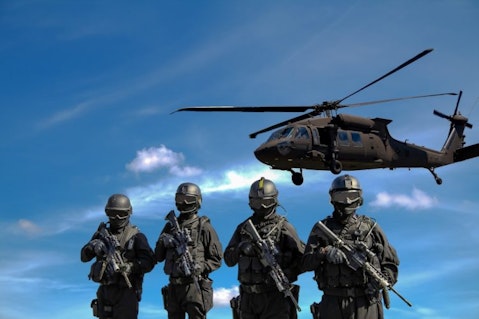In this article, we will be taking a look at the 15 most powerful Islamic countries in the world. To skip our detailed analysis, you can go directly to see the 5 most powerful Islamic countries in the world.
There are currently 55 countries with an Islamic majority, who are a part of the Organisation of Islamic Cooperation. The second-largest religion in the world, there are currently approximately 1.9 billion Muslims in the world, and the figure is expect to rise consistently and continuously because of high population growth rates of many Muslim-majority countries, while even in countries where Muslims are a minority, Islam is the fastest growing religion. In the UK, Muslims make up around 6.5% of the total population, a major growth from 4.9% in 2011. However, almost 40% of Muslims live in impoverished areas in the country, which has led many to believe that Muslims in the country are trapped in a cycle of poverty.
Even though Muslim countries make up a sizable part of the global population, their economies aren’t doing so well. On one hand, you have smaller countries in the Middle East such as Oman, United Arab Emirates, Kuwait and Qatar which have huge oil deposits because of which they are among the wealthiest nations in the world in terms of GDP per capita, but because of their small population size, this doesn’t really translate well into absolute wealth. On the other hand, you have some of the most populous countries in the world including Indonesia which has the highest number of Muslims in the world, followed by Pakistan. While Indonesia’s economy is still stable and continues to grow, Pakistan’s economy has suffered significantly because of various reasons which we will discuss later. Most Muslim nations are located either in Africa or Asia, and while possessing great potential for development, have seen their economies stagnate in recent years. This is why the combined GDP of these 55 Muslim countries is less than $8 trillion, a fraction of the GDP of the U.S. alone, the biggest economy in the world.

Photo by Somchai Kongkamsri from Pexels
On the other hand, despite economic vulnerability and uncertainty, the most powerful Islamic countries in the world boast fearsome militaries. Unlike in the West, many of these countries are in constant turmoil and have strained relationships with their neighbors or other countries, because of which spending on the military takes precedence rather than on improving the standard of living or long-term economic development. In fact, many countries in the Middle East have massive arms deals with the U.S. in an attempt to bolster their defenses though often, it’s just their attack which is bolstered. Even in the second half of 2022, two huge arms deals were agreed by U.S. President Biden to Saudi Arabia and the United Arab Emirates worth over $5 billion. As we discussed earlier, the Middle East is home to some very wealthy Muslim countries, because of which they have the resources to purchase arms. Threats by countries nearby included Houthi rebels in Yemen attacking both countries with rockets. Meanwhile, Saudi Arabia, another controversial oil-rich nation with questionable human rights, is a major arms partner to the U.S., and in 2017, the U.S. and Saudi Arabia signed a series of letters of intent for the latter to purchase weapons amounting to $110 billion from the former over a period of 5 years, and $350 billion across a decade. Some of the biggest defense contractors in the world including Lockheed Martin Corporation (NYSE:LMT), Raytheon Technologies Corporation (NYSE:RTX) and Northrop Grumman Corporation (NYSE:NOC) are all active in the Middle East.
On the other hand, some countries have invested heavily in their military despite not having sufficient wealth, including Pakistan, which has had to spend on military because of terrorism threats both from within and external, not to mention increasing tension with India over the last decade which almost culminated in a war in 2019 after an Indian fighter jet invaded Pakistani airspace and was promptly shot down. Meanwhile, the Taliban’s retaking of Afghanistan has created a security threat from Pakistan’s eastern border. Similar conflicts in Africa, both internal and external, have resulted in countries in the continent also spending heavily on military even though African nations dominate the list of poorest countries in the world.
Despite the issues faced by some of the most powerful Islamic countries in the world, there can be no doubt that they are integral to the world’s economy. Even though some countries, such as Yemen, Syria and Iran, are under heavy sanctions by Western nations for a variety of nations, that does not mean that their economy has come to a standstill, with Iran’s biggest trade partner being China, followed by the UAE and then India. In fact, China is a major trade partner for most Muslim countries and in fact accounts for over 15% of all exports to the Middle East and North Africa according to the World Bank, and is followed by the U.S. at 8.2%.
To determine the most powerful Islamic countries in the world, we first identified Muslim nations as those which were part of the Organization for Islamic Cooperation. We then calculated the GDP of each nation, before ascertaining their military strength based on global rankings by Global Firepower. We then assigned 60% weightage to GDP and 40% to military strength. After all, if a country has a strong military but a very weak economy, its power and influence is not as significant. We then deducted the average score from 100 to come up with our score for each country, sorted highest to lowest. So, let’s take a look at the Muslim countries looking to be a force in global politics, starting with:
15. Qatar
Insider Monkey Score: 66.2
Qatar is one of the richest nations in the world in terms of GDP per capita because of its vast oil reserves. In 2017, Saudi Arabia, Bahrain, the United Arab Emirates and Egypt all ended diplomatic relations with Qatar resulting in a blockade which lasted till early 2021. Despite this embargo, Qatar developed better relationships with Turkey and Iran, and actually emerged stronger both economically and militarily.
14. Morocco
Insider Monkey Score: 66.6
Morocco’s economy is relatively liberal after privatization of many companies in the 1990s. One of the most expensive countries in Africa, it was also ranked first in the quality of life index by the Economist Intelligent Unit.
13. Kazakhstan
Insider Monkey Score: 67.6
Kazakhstan is home to the largest economy in Central Asia, as the former Soviet Republic continues to grow its GDP. In addition to deriving income from manufacturing and service sectors, the nation is also home to oil, minerals and metal reserves.
12. United Arab Emirates
Insider Monkey Score: 74.0
The UAE is one of the most visited countries in the world, as it continues to try and diversify its economy from oil, which is the basis of the country’s riches. After establishing relations with Israel recently after decades of enmity, the UAE recently combined with Israel on a joint naval vessel as military ties between the countries grow.
11. Malaysia
Insider Monkey Score: 78.4
Malaysia has generally enjoyed stability over the last three decades, but this has evaded the nation recently with political upheaval taking center stage. It is still the 8th largest economy in the Muslim world.
10. Iraq
Insider Monkey Score: 79.4
Iraq’s economy was decimated when the U.S. invaded the country in 2003 on the pretext of searching for weapons of mass destruction, which were never found. However, it is still among the most powerful Islamic countries in the world.
9. Bangladesh
Insider Monkey Score: 81.0
Bangladesh gained independence from Pakistan in 1971, a little over 50 years ago but has grown significantly and steadily since. Considered to be among the fastest growing economies in the world, the country has made great strides in development and aspires to become an upper-middle income country by 2031. Since its independence, the country has received over $35 billion from the World Bank.
8. Algeria
Insider Monkey Score: 81.2
Algeria’s economy is still expected to grow by 3.7% in 2022 amid a slowdown, with the country’s economy dependent on oil. While oil prices fell heavily when the Covid-19 pandemic hit in 2020, they have recovered since and Algeria’s ecnomy has recovered accordingly as well.
7. Nigeria
Insider Monkey Score: 83.2
Nigeria is expected to become the most populated Muslim country in the world in a couple of decades, with its high population growth being a detriment to its economic growth. Internal conflict has also been a burden on resources in the country.
6. Iran
Insider Monkey Score: 87.8
Iran is an enigma; it has continued to remain influential despite massive Western sanctions for pursuing nuclear proliferation and its dismal relationship with Israel. With its threats mainly coming from Israel and Saudi Arabia, Iran has also invested heavily in its military and thus remains a powerful country to come up against.
Click to continue reading and see the 5 most powerful Islamic countries in the world.
Suggested articles:
- 35 Most Beautiful Places In The World
- 8 Best Insider Trading Websites in 2023
- 10 Cheap Jim Cramer Stocks to Buy
Disclosure: None. 15 most powerful Islamic countries in the world is originally published at Insider Monkey.





